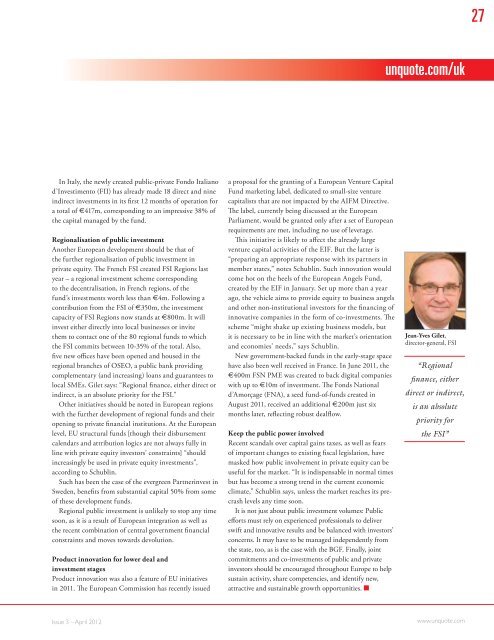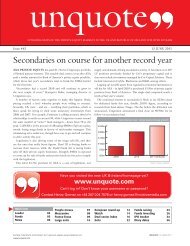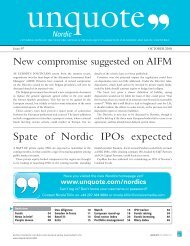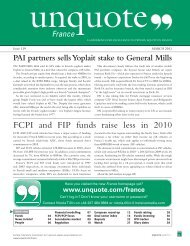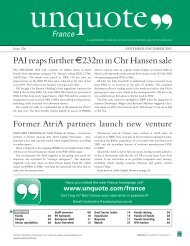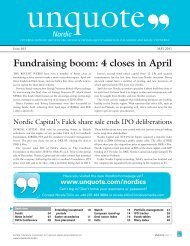uk & ireland - Unquote
uk & ireland - Unquote
uk & ireland - Unquote
You also want an ePaper? Increase the reach of your titles
YUMPU automatically turns print PDFs into web optimized ePapers that Google loves.
27<br />
unquote.com/<strong>uk</strong><br />
In Italy, the newly created public-private Fondo Italiano<br />
d’Investimento (FII) has already made 18 direct and nine<br />
indirect investments in its first 12 months of operation for<br />
a total of €417m, corresponding to an impressive 38% of<br />
the capital managed by the fund.<br />
Regionalisation of public investment<br />
Another European development should be that of<br />
the further regionalisation of public investment in<br />
private equity. The French FSI created FSI Regions last<br />
year – a regional investment scheme corresponding<br />
to the decentralisation, in French regions, of the<br />
fund’s investments worth less than €4m. Following a<br />
contribution from the FSI of €350m, the investment<br />
capacity of FSI Regions now stands at €800m. It will<br />
invest either directly into local businesses or invite<br />
them to contact one of the 80 regional funds to which<br />
the FSI commits between 10-35% of the total. Also,<br />
five new offices have been opened and housed in the<br />
regional branches of OSEO, a public bank providing<br />
complementary (and increasing) loans and guarantees to<br />
local SMEs. Gilet says: “Regional finance, either direct or<br />
indirect, is an absolute priority for the FSI.”<br />
Other initiatives should be noted in European regions<br />
with the further development of regional funds and their<br />
opening to private financial institutions. At the European<br />
level, EU structural funds [though their disbursement<br />
calendars and attribution logics are not always fully in<br />
line with private equity investors’ constraints] “should<br />
increasingly be used in private equity investments”,<br />
according to Schublin.<br />
Such has been the case of the evergreen Partnerinvest in<br />
Sweden, benefits from substantial capital 50% from some<br />
of these development funds.<br />
Regional public investment is unlikely to stop any time<br />
soon, as it is a result of European integration as well as<br />
the recent combination of central government financial<br />
constraints and moves towards devolution.<br />
Product innovation for lower deal and<br />
investment stages<br />
Product innovation was also a feature of EU initiatives<br />
in 2011. The European Commission has recently issued<br />
a proposal for the granting of a European Venture Capital<br />
Fund marketing label, dedicated to small-size venture<br />
capitalists that are not impacted by the AIFM Directive.<br />
The label, currently being discussed at the European<br />
Parliament, would be granted only after a set of European<br />
requirements are met, including no use of leverage.<br />
This initiative is likely to affect the already large<br />
venture capital activities of the EIF. But the latter is<br />
“preparing an appropriate response with its partners in<br />
member states,” notes Schublin. Such innovation would<br />
come hot on the heels of the European Angels Fund,<br />
created by the EIF in January. Set up more than a year<br />
ago, the vehicle aims to provide equity to business angels<br />
and other non-institutional investors for the financing of<br />
innovative companies in the form of co-investments. The<br />
scheme “might shake up existing business models, but<br />
it is necessary to be in line with the market’s orientation<br />
and economies’ needs,” says Schublin.<br />
New government-backed funds in the early-stage space<br />
have also been well received in France. In June 2011, the<br />
€400m FSN PME was created to back digital companies<br />
with up to €10m of investment. The Fonds National<br />
d’Amorçage (FNA), a seed fund-of-funds created in<br />
August 2011, received an additional €200m just six<br />
months later, reflecting robust dealflow.<br />
Keep the public power involved<br />
Recent scandals over capital gains taxes, as well as fears<br />
of important changes to existing fiscal legislation, have<br />
masked how public involvement in private equity can be<br />
useful for the market. “It is indispensable in normal times<br />
but has become a strong trend in the current economic<br />
climate,” Schublin says, unless the market reaches its precrash<br />
levels any time soon.<br />
It is not just about public investment volumes: Public<br />
efforts must rely on experienced professionals to deliver<br />
swift and innovative results and be balanced with investors’<br />
concerns. It may have to be managed independently from<br />
the state, too, as is the case with the BGF. Finally, joint<br />
commitments and co-investments of public and private<br />
investors should be encouraged throughout Europe to help<br />
sustain activity, share competencies, and identify new,<br />
attractive and sustainable growth opportunities. <br />
Jean-Yves Gilet,<br />
director-general, FSI<br />
“Regional<br />
finance, either<br />
direct or indirect,<br />
is an absolute<br />
priority for<br />
the FSI”<br />
Issue 3 – April 2012<br />
www.unquote.com


